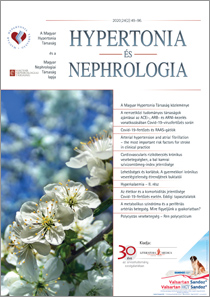Az eLitMed.hu orvostudományi portál a böngészés tökéletesítése érdekében cookie-kat használ.
Ha bővebb információkat szeretne kapni a cookie-k használatáról és arról, hogyan módosíthatja a beállításokat, kattintson ide: Tájékoztató az eLitMed.hu Cookie-használatáról.
Részletes keresés
Kérjük, állítsa be a paramétereket!
Találatok száma: 1
Arterial hypertension and atrial fibrillation - the most important risk factors for stroke in clinical practice
Vascular stroke is a very frequent cause of morbidity and mortality, and in patients who suffered stroke subsequent long-term neurological deficit of greater or lesser extent is an important factor. Numerous clinical and epidemiological studies confirmed that elevated systemic blood pressure is among the main risk factors of both ischemic and hemorrhagic vascular stroke, the effects of arterial hypertension being very complex including morphological and functional changes in vessels and vascular circulation. In our retrospective analysis of 218 patients hospitalized for stroke we found arterial hypertension in 91.2% of subjects and atrial fibrillation in 32.1% of subjects. 182 patients (83.5%) have been diagnosed with ischemic stroke and 36 patients (16.5%) with hemorrhagic stroke. In the group of patients with atrial fibrillation, only 33 patients (47.1%) were treated by anticoagulants, what points out an inadequate indication of anticoagulant treatment when considering the stroke risk calculation for atrial fibrillation (CHA2DS2- VASc Score) and bleeding risk (HAS-BLED Calculator for Atrial Fibrillation). It is also noteworthy that in the group of patients with anticoagulant therapy who have developed ischemic stroke in spite of this treatment, we found that in 48.5% the treatment was underdosed and therefore ineffective. Our work points to the need to improve the effective management of arterial hypertension and atrial fibrillation, the most common modifiable factors of vascular strokes.
1.
2.
3.
Ideggyógyászati Szemle Proceedings
Egészségügyi szakmai irányelv az akut ischaemiás stroke diagnosztikájáról és kezeléséről4.
5.
1.
2.
Klinikai Onkológia
A rosszindulatú daganatok fenotípusának plaszticitása és az immunogén mimikri3.
Klinikai Onkológia
A szarkopénia mérése komputertomográfiával és jelentősége az onkológiai betegeknél4.
5.



